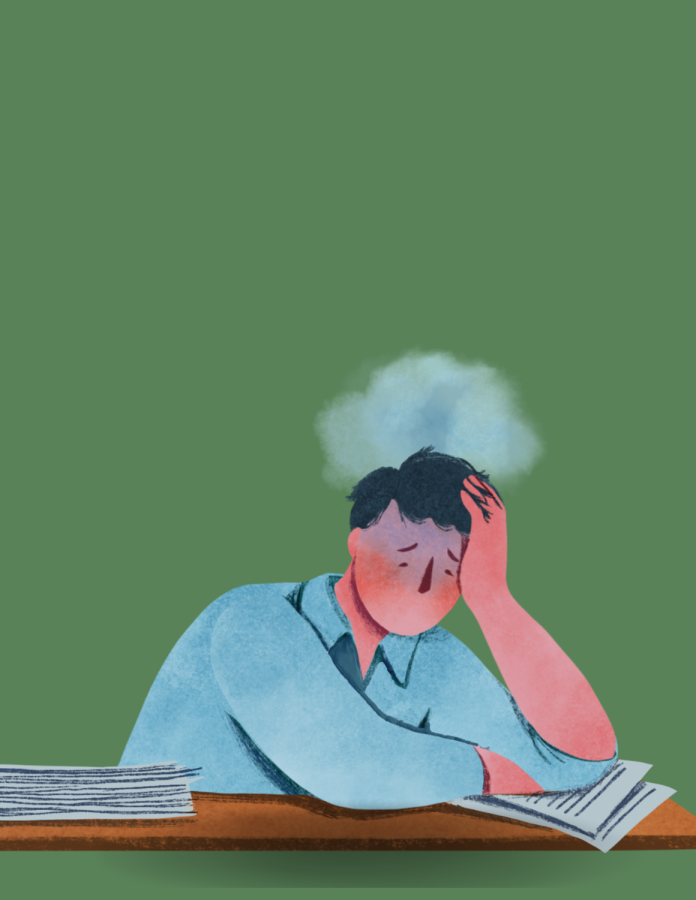Test Anxiety: High-stakes tests and poor coping skills push some students over the edge
April 5, 2022
Many students suffer from some level of performance anxiety through their years, but the most common performance anxiety is called test anxiety.
Test anxiety is a feeling someone might have in a situation where the way in which they perform a task really counts, or when the pressure is on to do well.
While many people may experience nervousness before a big exam, having feelings of severe anxiety can lead to some very unhealthy results. For example, a person might have test anxiety right before taking a big test that is worth a lot of points or an exam to get into a good school.
Test anxiety is not the same as performing badly on certain tests for reasons such as a break up or the passing of a loved one. Though these things would prevent someone from performing well on a test, this is not the same thing as test anxiety.
Causes of test anxiety
According to the website “Verywell Mind,” which is dedicated to helping students who are battling mental health issues, there are a lot of things that can lead to test anxiety, such as; poor study habits, poor past test performance and things like other underlying anxiety problems.
Right before a test or big exam, the body releases a fair amount of a hormone called adrenaline, causing a fight or flight response. So, you may feel like your only options at that moment are to stay put and deal with the situation, or escape it entirely.
Perfectionism can also be a contributor to test anxiety. Perfectionism can drive someone to do their very best in what they do, but it can also be really unhealthy and can lead to even more stress, anxiety, and over obsessiveness. This can greatly affect the quality of test taking abilities.
Test anxiety in people
Test anxiety can look different in different people. For LSE freshman Kianna Isom, test anxiety manifests physically. She begins to tremble and sweat, gets a pit in her stomach and is unable to speak properly.
“The pit feels like how I imagine a dark hole feels like; it feels kind of like it’ll swallow me whole and just makes me feel off,” Isom said. “The trembling is normally in my hands and is very subtle, but I feel like the whole world can see it at the moment.”
Other symptoms of test anxiety can include rapid heartbeat, dry mouth, fainting, nausea and a sense of “butterflies”.
Some common emotional symptoms can be depression, low self-esteem, anger, feeling hopeless, distress and more.
Some cognitive behavior can be presented as fidgeting, negative talk and outright avoidance of testing itself.
Sometimes a person’s test anxiety can be so severe that some students would drop out of school to avoid the source of their fears.
Somatic and Cognitive
Somatic anxiety is a physical manifestation of anxiety that can present in fidgeting or shortness of breath. Although this anxiety can be found in all people in an uncomfortable or stressful situation, somatic anxiety can be a real problem when trying to focus on a test. Cognitive anxiety refers more to one’s thoughts and mental aspects. Having negative expectations, worries or concerns at the situation at hand are examples of cognitive anxiety.
Preventing test anxiety
According to Mayo Clinic, a medical institution, some efficient ways to prevent having a full-on panic attack while taking a test are finding more effective study methods and establishing a constant pretest routine. Making sure to eat and/or drink something before taking the test can lead to being more alert and can lessen the risk of feeling panicked during an exam.
Calming the mind is a big step in preventing any type of anxiety. Reading carefully through a test to make sure nothing is missed, watching the clock, focusing on deep steady breathing, and having a positive mental attitude are also effective ways.
LSE counselor Skyler Reising works with students who come in seeking advice for their test anxiety.
“I think high school can be kind of high stakes for a lot of students, especially when it comes to the ACT because that test can sometimes determine whether you get into the school you want to go to or the scholarship you get,” Reising said.
For someone with test anxiety, the ACT will be one of the more difficult exams to approach because this is a test that can primarily determine one’s future.
“Test anxiety is largely related to test preparation, so make sure you do a review guide if you’ve been given one,” Reising said. “[Also] doing all of your homework before you take a test and taking some time to study all help reduce the anxiety because once you know the material, your confidence on how well you do on a test is higher.”
According to Reising, these steps can help alleviate stress. However, on the day of the test, he says it is normal to experience some test-day jitters.
“Once it’s time to go take the test, you still might have some nervousness, but you won’t be as stressed than if you haven’t prepared for the test,” Reising said.
Test anxiety can be immensely difficult to get over, but it is definitely not impossible. Just remember that if you are someone who is suffering from test anxiety, be sure to talk your school counselor about coping mechanisms and productive study methods.









